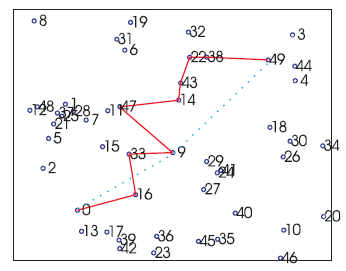TR2009-055
Cooperative Routing for Wireless Networks Using Mutual-Information Accumulation
-
- , "Cooperative Routing for Wireless Networks using Mutual-Information Accumulation", arXiv, August 2009.
-
Research Area:

Abstract:
Cooperatioin between the nodes of wireless multihop networks can increase communication reliability, reduce energy consumption, and decrease latency. The possible improvements are even greater when nodes perform mutual information accumulation using rateless codes. In this paper, we investigate routing problems in such networks. Given a network, a source, and a destination, our objective is to minimize end-to-end transmission delay under energy and bandwidth constraints. We provide an algorithm that determines which nodes should participate in forwarding the message and what resources (time, energy, bandwidth) should be allocated to each. Our approach factors into two sub-problems, each of which can be solved efficiently. For any transmission order we show that solving for the optimum resource allocation can be formulated as a linear programming problem. We then show that the transmission order can be improved systematically by swapping nodes based on the solution of the linear program. Solving a sequence of linear programs leads to a locally optimal solution in a very efficient manner. In comparison to the proposed cooperative routing solution, it is observed that conventional shortest path multihop routing typically incurs additional delays and energy expenditures on the order of 70%. Our first algorithm is centralized, assuming that routing computations can be done at a central processor with full access to channel state information for the entire system. We also design two distributed routing algorithms that require only local channel state information. We provide simulations showing that for the same networks the distributed algorithms find routes tha are only about two to five percent less efficient than the centralized algorithm.